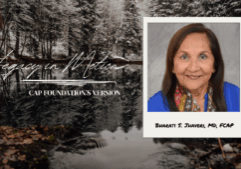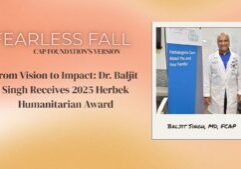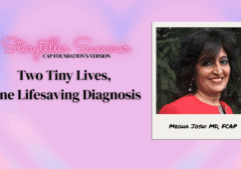Global Grant Supports Labs in Rwanda, Impresses at CAP24

Clinicians from the Baylor College of Medicine, with a grant from the CAP Foundation, helped empower and improve diagnostic medicine in Rwanda through an innovative and low-cost project using 3D-printed parts for telepathology.
After receiving the CAP Foundation Global Pathology Development Grant in 2023, the multidisciplinary team traveled to the University Teaching Hospital of Butare (CHUB) in southern Rwanda to test and deploy their micrscope system. Esentially, the OpenFlexure Miscroscope system allows laboratories to 3D print plastic microscope pieces and use other readily available materials to simplify, improve, and digitize their dianostic processes, according to project leaders.
Pahtologists Daniel Rosen, MD, FCAP, and Kelsey Hummel, DO, led the clincial aspect of their mission and teamed up with Joe Knapper, a post doctorate research associate at Glasgow University and a developer of the OpenFlxure Microscope.
These microscopes are currently being used to train pathologists and allow the hospital to conduct telepathology diagnoses, which save both patients and hospital officials from lengthy travel to get tested or deliver samples to better equiped facilites. Before these capabilites, samples or patientswould sometimes travel over 200 km north to the Butaro Cancer Centre. According to .
Knapper explained that they key of their new system is in its simplicity and low costs.
“Every part of this project is based around improving accessibility—we don’t want budget, training levels, or location to restrict anyone from having access to lifesaving diagnostic tests.”
He conitnued, “This means our device is designed to be maintained and repaired in and by the community that’s using it. There’s no dependence on external contracts, engineers, or complex supply chains.”
These are all pain points in providing reliable and equitable health care in locations across the globe, particularly in remote areas with scarce resources.
“We wanted to demonstrate that historically underserved communities can have access to cutting edge medical techniques, including telepathology,” Knapper said. “From there, everything can change: conditions including cancer and malaria can be diagnosed remotely, medical students can be trained on local cases, overworked pathologists can streamline their workflow, and lives will be saved.”
Knapper and his team shared the results of their intiative at the CAP24 annual meeting with demonstrations at the CAP Foundation booth and a special session during the House of Delegates meeting on October 19. While Knapper said this was his first time attending a medical conference or meeting, the response was overwhelmingly positive.
“We had so much interest from CAP members and the House of Delegates—everyone had a great suggestion, useful feedback, or a potential project for us to set up,” Knapper said. “It was great for us to engage with people with so many ideas for what our next projects could be.”
To learn more about this project including interviews with the team, be sure to watch the video at the top of the page. If you’d like to learn more about OpenFlexure technology, visit their site.
More Stories
Why Donate
Every person deserves a diagnosis. Support care beyond the microscope. Expand access to pathology-locally and globally.










